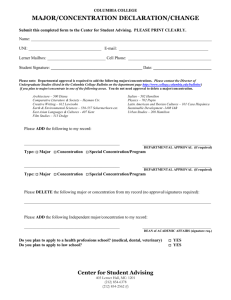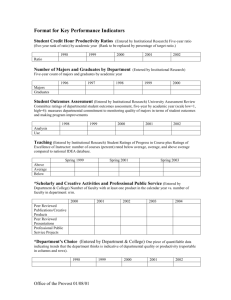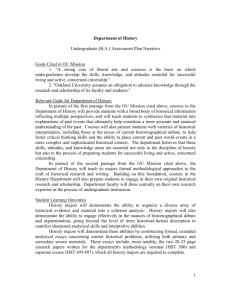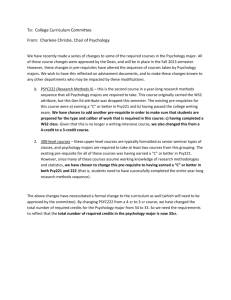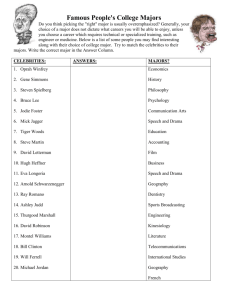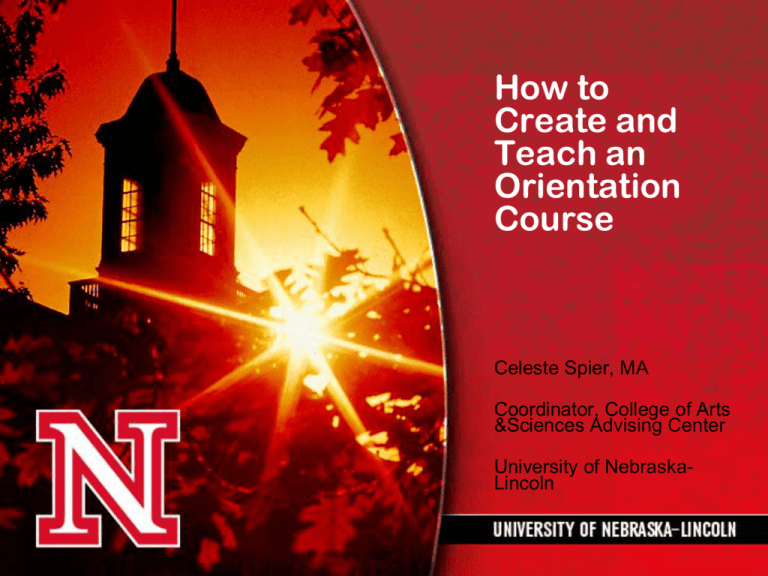
How to
Create and
Teach an
Orientation
Course
Celeste Spier, MA
Coordinator, College of Arts
&Sciences Advising Center
University of NebraskaLincoln
Agenda
•
•
•
•
•
Current Research on Orientation Courses
Possible Course Structures
Content Options
Assignment Options
Degree Application Considerations
Introduction
• Psychology Adviser, Department of Psychology,
University of Nebraska-Lincoln (6 years)
• Taught an orientation course called PSYC 100:
Career Planning for Psychology Majors
o 180 students per semester (360 total for academic
year)
o 1 credit
o Pass/No Pass
o Required for all Psychology Majors
• Made significant improvements to the course over 6
years
Audience Poll
• How many of you want to:
o Create a new orientation course?
o Improve a current orientation course?
o Just learn more about orientation courses (neither
of the above options)?
Current Research
• Orientation courses have been one of the most
successful techniques employed to increase
graduation and retention rates (Davig & Spain, 20032004)
• Orientation courses have also been associated with
increased satisfaction with their college experience, a
stronger rating of academic advising, a stronger
connection to faculty, and increased success after
college (Hendel, 2006)
• Students report the following as the most important
topics to cover: study skills, advising information,
and curriculum planning (Davig & Spain, 2003-2004).
Current Research
• Orientation courses are not likely to provide career
information, but evaluations show that students
request more information regarding career choices
(Davig & Spain, 2003-2004)
o In a study by Macera and Cohen (2006), 93% of
students reported their career plans being affected
by the course, with 62% changing their plans
• Research on overall student perceptions of
orientation courses are overwhelmingly positive
(Macera & Cohen, 2006)
Curriculum Process
• Familiarize yourself with the university, college, and
departmental curriculum process at your school
o Who is on the curriculum committee?
o When do they meet?
o What are the deadlines for submissions for the
next academic year?
• Become an expert in this process before you develop
your curriculum
Possible Course Structures
• University-wide
o Pros: All students on campus are involved, Connects students to
other majors and perspectives
o Cons: Must have buy-in and resources from university, Content
won’t be as targeted, More administrative coordination necessary
• College-wide
o Pros: Content can be more targeted, Smaller number of students,
Students connect with students, advisers, and faculty in their
college
o Cons: Some college are still quite diverse, Course designation
Possible Course Structures
• Departmental
o Pros: Content can be very targeted, Students connect with other
students in their major, their adviser, and faculty in their department
o Cons: Must have buy-in from departmental advisers, faculty, and
chair, Quality and content can vary among departments, May be a
big time and energy commitment depending on size of department
• Programmatic/Population-Based
o Pros: Target specific groups of students who may be at risk for
retention, Course could be tied to learning community, scholarship,
etc…
o Cons: Difficult to identify the students, Student may have diverse
majors, career goals, and other needs
Possible Course Structures
• Lectures
o Advisers
o Faculty
o Guest Speakers
• Small Group Discussion
o Inside of class time, if class is small
o Outside of class time, if class is large
• Panels
o Faculty or undergrads Research Assistants to discuss research
o Current upper-class students to discuss college/major
o Professionals or alumni to discuss careers
• Tours
Possible Course Structures
• Who should teach it?
o Faculty member
o Adviser
o Undergraduate Teaching Assistants
• When should it be offered?
o Ensure it does not conflict with other required
courses for major/degree
o Have a plan for non-traditional students
o Must sure there is enough class space for retakes
Possible Course Structures
• When should the course be taken?
o Most models have the students taking the course
as early in their college career as possible
o First 6 weeks in college, and transition from
freshman to sophomore year are especially critical
• Should the course be online or in-class?
o In-class is preferred
o Online module format can be done
• How many weeks long should it be?
o 7-10 is common
Content Options
• Study Skills, Time Management, & Adjustment to
College
• Degree Requirements & Policies
• Demonstration of Online Resources
• Career Information
o Potential Careers
o Career Preparation
• Preparing for Graduate or Professional School
• Research/Creative Activity Opportunities
• Departmental/Major Content Information
Assignment Options
• Study Skills, Time Management, & Adjustment to
College
o Attend a meeting for (or join) a student organization
o Create a weekly schedule and an semester calendar
o Weekly journaling
• Campus Resources
o Attend a session with an Academic Success Coach (or Writing
Center, Math Resource Center, Career Services, Education
Abroad, etc…)
o Interview a campus student leader and write a summary report
• Demonstration of Online Resources
o Bring degree audit to class
o Register for next semester and confirm with an academic adviser
Assignment Options
• Degree Requirements and Policies
o Set up individual advising appointment
o Readings from university bulletin and other websites
o Create a graduation plan
• Career Information
o Conduct career interviews with people in professions you may want to
pursue
o Research a career of interest
o Attend the career fair and talk to 3 employers (Take a selfie at the fair!)
o Create a resume
o Create a career action plan
o Register for your school’s job search website (e.g. Husker Hire Link)
o Create an account on LinkedIn
o Take a career assessment
o Write out your 5- and 10-year career goals
Assignment Options
• Preparing for Graduate or Professional School
o Write a paper about what you will need to do to get into your
desired post-undergraduate program
o Meet with a pre-professional adviser or graduate admissions
representative
• Departmental/Major Content Information
o Write a short literature review about a topic within your major
o Read a journal article from a major-related journal and write a
summary
o Attend a professor’s open office hours and introduce yourself
o Interview faculty, postdoc, or graduate student about their area of
study
• Research/Creative Activity Opportunities
o Read about faculty research interests on your major’s website
Assignment Options
• General Assignments
o
o
o
o
Write a reflection paper to demonstrate doing an activity listed
Require attendance
Quizzes and Exams
Textbook
Degree Application Considerations
• Required or Optional
o If optional, you end up “preaching to the crowd”
• Letter Grade or Pass/No Pass
• Credit or Non-Credit
o 0 or 1 credit (1-1.5 hours per week)
o Avoid the combination of optional and 0 credit
• Policy for Waiving the Course
o
o
o
o
Non-traditional students
2nd majors (if course is departmental)
Transfer students
Upper-Class students
Questions
• What questions do you have at this point?
Small Group Discussion
• Break into small groups of your choice
• Potential discussion questions
o What concerns do you have about developing an
orientation course?
o What barriers have you run into when trying to
develop an orientation course?
o What improvements would you like to make in
your current orientation course?
o What have you already done that could be shared
as a best practice?
References
Davig, W. B. & Spain, J. W. (2003-2004). Impact on
freshmen retention of orientation course content:
Proposed persistence model. Journal of College
Student Retention, 5(3), 305-323.
Hendel, D. D. (2006-2007). Efficacy of participating in
a first-year seminar on student satisfaction and
retention. Journal of College Student Retention,
8(4), 413-423.
Macera, M. H. & Cohen, S. H. (2006). Psychology as a
profession: An effective career exploration and
orientation course for undergraduate psychology
majors. The Career Development Quarterly, 54.
Thank you.
Celeste Spier, MA
Coordinator, College of Arts & Sciences Advising
Center
University of Nebraska-Lincoln
cspier2@unl.edu
©2007 The Board of Regents of the University of Nebraska. All rights reserved.

